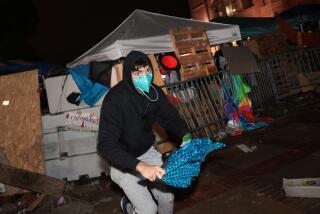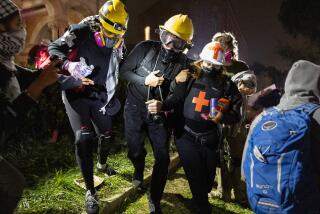Vieques Protesters Removed Without Incident
- Share via
VIEQUES, Puerto Rico — Wielding weapons, plastic handcuffs and common courtesy, federal agents in riot gear cleared a U.S. Navy bombing range of protesters Thursday, ending a yearlong standoff but hardly resolving an issue that has stirred strong feelings throughout the commonwealth.
There was no resistance, and no actual arrests were made in the raid that began with the Caribbean dawn.
Instead, about 140 people rounded up at several makeshift beach camps on the bombing range, and about 60 others hauled away from an encampment blocking the front gate of Camp Garcia, were taken by boat to the island of Puerto Rico and released. They were warned, however, that they would face felony trespassing charges if they reenter the range.
Among more than 200 people handcuffed and ushered off the eastern end of the island were religious leaders, including Roman Catholic Bishop Alvaro Corrada del Rio of San Juan, and two U.S. lawmakers: Reps. Luis V. Gutierrez (D-Ill.) and Nydia M. Velazquez (D-N.Y.).
Although no violence was reported--and indeed, some protesters praised the civil attitude of 100 U.S. marshals and 100 FBI agents--the decision to round up the protesters sparked at least three street demonstrations, including two in San Juan, the island’s capital. As organizers appealed for calm, supporters of the Vieques protest faced off with baton-wielding riot police on horseback in front of the U.S. Army’s Ft. Buchanan.
Later, in a plaza in Old San Juan, several thousand people gathered to listen to speakers, wave Puerto Rican flags and shout, “Fuera Marina”--Navy out!
In Vieques, about 300 people marched back toward the gate of Camp Garcia but were turned back by police.
Pentagon officials said the Navy intends to resume training exercises on Vieques within two weeks, after sweeping the range to make sure that all protesters have been removed. Other offshore activities, including ship-to-ship firing and submarine exercises, are to proceed as scheduled.
Adm. Robert J. Natter, director of operations for the Navy staff, said Navy officials were “fairly confident” they would be able to keep protesters off the range, although he noted that the area is big enough that “it’s not easy to patrol.”
After being released from custody, protest leaders also promised that they would continue their campaign to force the Navy to withdraw completely from the eastern end of Vieques, used as a live-fire bombing range for almost 60 years.
“All indications are that the protesters have handled themselves in a peaceful and dignified manner,” said Atty. Gen. Janet Reno at a Washington news conference. She added that the operation had gone “very, very smoothly.”
When asked why the demonstrators would not be charged, Reno said: “We’re trying to make sure that people understand that we intend to enforce the laws but that we want to do so in a fair and measured way.”
Indeed, the 52 reporters and photographers escorted from the scene said the courtesy of the armed U.S. marshals and FBI agents who arrived on the beach after daybreak lent a surreal air to the operation. The raid had the trappings of a massive military invasion. As helicopters buzzed overhead and Navy gunships patrolled offshore, agents piled out of white vans and announced in each of the camps that protesters must leave immediately. Only a few resisted, forcing agents to gently carry them to waiting vehicles.
At times agents waited patiently for those being detained to finish making statements to reporters before loading the protesters into Navy Humvees. They tried not to obstruct photographers. At one point a federal marshal, speaking in Spanish, advised protesters to watch their step as they filed out of a wooden chapel erected at one of the camps.
“They are trying to be extremely kind and generous and courteous, but I think they understand they are wrong because they have lost any moral authority to use force against these people,” said Gutierrez, handcuffed and standing in the back of an open truck.
Puerto Rico’s Gov. Pedro Rossello congratulated demonstrators “for their own peaceful attitude” and lauded “state and federal law enforcement agencies for the prudence with which they carried out this directive from President Clinton.
“I believe that this is a very positive day for Puerto Rico,” he said.
Clearing the range of protesters hardly ends this simmering controversy over Vieques, located about seven miles east of Puerto Rico. The hilly island has about 9,000 people, several small hotels and guest houses, and a modest but growing tourism trade.
“The Puerto Rican community will continue to put pressure on the military,” said Velazquez, who represents part of New York City’s large Puerto Rican population. “The range is not necessary.”
The military says it is. But in a January deal between the Clinton administration and Rossello, the Navy agreed to fire only dummy bombs on the range for the next three years while giving Vieques $40 million for economic development. The agreement also calls for Vieques residents to vote in a referendum on whether they want a permanent halt to military training here; the military has agreed to honor the vote.
By afternoon, all of about a dozen protester camps had been cleared, and coils of razor wire were being strung along the entrance of Camp Garcia, which includes the bombing range. Crews of U.S. Marines were also brought in to help clear the range of wooden buildings and tents erected by protesters, who began occupying it after two errant 500-pound bombs killed civilian security guard David Sanes in April 1999. That incident unleashed a wave of anti-military sentiment in Puerto Rico, claimed by the U.S. as booty after the 1898 Spanish-American War.
The raid came less than two weeks after federal agents, also directed by Reno, stormed the home of Elian Gonzalez’s Miami relatives to seize the 6-year-old Cuban boy and reunite him with his father. Although violence was avoided in that operation, agents came in with both heavy arms and a gangbusters style, which some Cuban exiles say led to widespread civil disobedience and more than 300 arrests.
Officials in Washington feared violence here. But restraint was urged by the World Council of Churches, Clinton and First Lady Hillary Rodham Clinton, who as a New York Senate candidate opposes continued bombing.
“The president is pleased that the operation moved forward in a peaceful fashion,” said White House spokesman Joe Lockhart.
*
Times staff writers Eric Lichtblau and Paul Richter in Washington and Edwin Chen in Minnesota contributed to this story.
More to Read
Sign up for Essential California
The most important California stories and recommendations in your inbox every morning.
You may occasionally receive promotional content from the Los Angeles Times.













